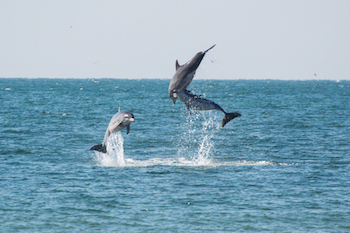With questions pertaining to the environment, it’s never about ‘us or them’. Beware any argument that implies this to be the case. Of course we want to do what’s best for us, or what’s best for our fellow humans, and the advocates of this argument know that. But what they don’t want you to notice is that the choice you’re being presented with is virtually always a false one.
Much of the time, it looks like we may need to compromise on what’s best for some other species in order to achieve what’s optimal for us. But is it? What’s far more likely to be true is that we need to preserve our connection with the natural world, and to ceaselessly strive to remain in harmony with it. When it comes to other species, indeed with the entire biosphere itself, their interests are our interests, and vice versa.
If someone’s interests are being sacrificed, it’s entirely likely that everyone’s are. We need to think in terms of systems and their continued functioning. An ecosphere is a complex dance of factors interacting in complex ways to maintain a balance. Pushing it out of balance never ends well. Thus we have a principle we can use to guide us when deciding on whether one project or another is worth doing.
Take, for example, a plan proposed for Barataria Bay, on Louisiana’s gulf coast.
Restoration projects are useful if we are to return ecosystems damaged by human encroachment to a healthier state. But these projects need to be beneficial for all of the species they impact – not just some, and certainly not just ours. So it is deeply concerning that what the Louisiana Coastal Protection and Restoration Authority hopes to do could cause the deaths of hundreds of dolphins. This is not the duty of care we owe to these intelligent, highly social animals.
The plan would divert large amounts of water and sediment from the Mississippi River into Barataria Bay. The benefit to us is that restored coastal ecosystems would offer flood protection to communities that was naturally there before our intervention. But for dolphins the low salinity that would result in these waters could have significant adverse consequences for their health. Scientists warn that it can cause these marine mammals to develop extensive lesions on their skin that can become painfully inflamed, often leading to death. Dolphins exposed to prolonged periods of low salinity have even been known to experience severe psychological reactions.
Essentially, we can’t sacrifice others in order to benefit ourselves. Or even to save ourselves, should it ever come to that. We have to save the whole, not pieces of it. We can’t be prepared to sacrifice a few individuals and somehow continue to believe that this will benefit the whole. Who could state categorically that the damage done by removing dolphins from the Barataria Bay ecosystem will be less significant than the benefits gained from this project? I, for one, certainly wouldn’t take such an assertion at face value.
Let’s also consider the context of what dolphins have already had to endure due to human actions in the last decade and a half. BP’s Deepwater Horizon oil spill in the Gulf of Mexico dumped 19 times more oil into the ocean than the Exxon Valdez did. Local populations of bottlenose dolphins have been cut by almost half since this event in 2010. Many that survive have developed chronic lung problems as a result of the spill. According to the National Oceanic and Atmospheric Administration (NOAA), all 21 species of cetaceans found in the Gulf were exposed to oil through subsurface, surface, and air contamination. This happened through a combination of breathing contaminated air; aspiration of liquid oil; and ingesting contaminated water or prey. Along with the most obvious lung impacts, NOAA also noted compromised immune function and increased reproductive failure.
The damage was so extensive that it extended to estuarine, coastal and shelf dolphin populations, as well as both whale and dolphin oceanic stocks. Among the most severely injured were the bottlenose dolphins of Barataria Bay and the Mississippi Sound. I think perhaps we’ve done enough, and now is not the time to hit these populations with yet another environmental factor that will be significantly detrimental to their well-being.
Even at the best of times, it isn’t in their best interest, or in ours, to act without considering the welfare of all species that will be impacted by our actions.
For The Orca’s Voice,
Phil, Canadian Cetacean Alliance



Leave a Reply